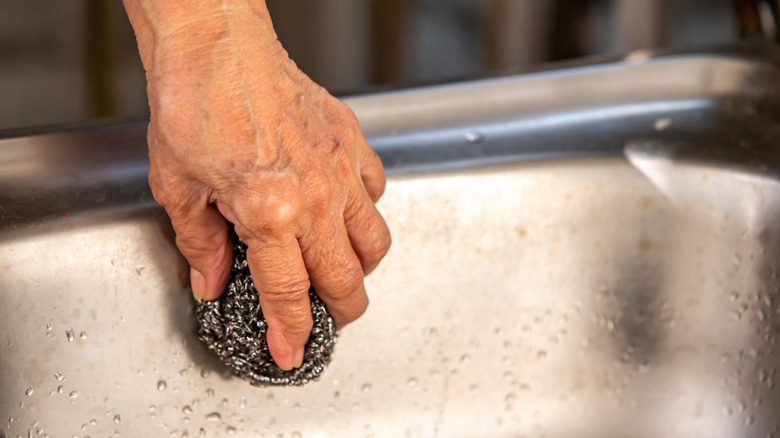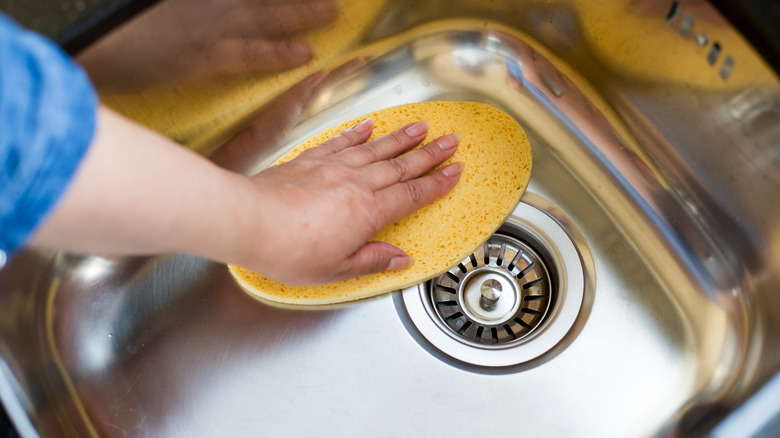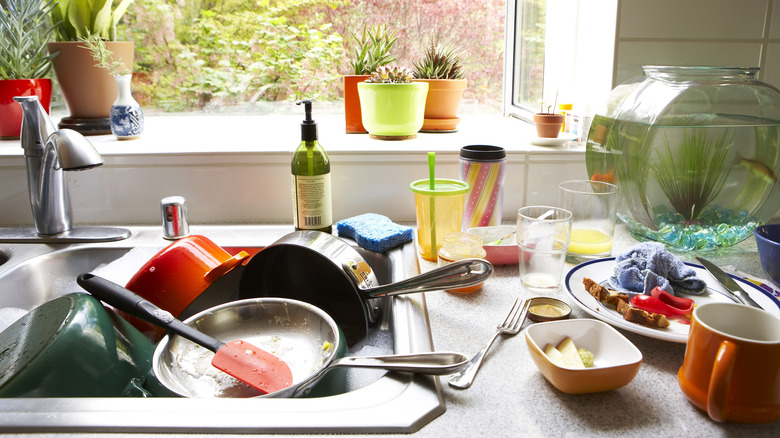Why You Should Avoid Cleaning Stainless Steel Sinks With Steel Wool At All Costs
The kitchen sink is one of the most used fixtures in the home and gets extremely dirty and grimy as time goes on. The stainless steel variety needs cleaning and maintenance regularly and thoroughly if you want to keep it in pristine condition. To achieve this goal, there's one big mistake that you should avoid making at all costs: cleaning your stainless steel sink with steel wool.
Although steel wool can work wonders when using it to clean cookware and dishes with stuck-on food, it can cause significant damage to your stainless steel sink. Steel wool is much too abrasive for a stainless steel sink and will scratch it, causing a noticeably dull appearance. In addition to this, it could leave behind particles that may result in significant rusting later on. While it's essential to clean your sink, be sure that you do it in a way that doesn't cause more harm than good.
How to clean your stainless steel sink correctly
To clean your stainless steel sink correctly, you'll want to rely on a simple solution of soap and water. However, make sure to use a non-abrasive sponge to scrub your sink, rather than opting for abrasive cleaning tools such as steel wool. Go over every inch of the sink to remove any dirt and residue that has accumulated. When you're done cleaning it, rinse it thoroughly.
Keep in mind that in addition to using a basic dish soap and sponge combo to clean your sink, there are some great cleaning hacks you can use to keep your kitchen sink sparkling. You may want to consider applying club soda to your sink and then wiping it dry with a cloth to make it shine. You can then dry it with a microfiber cloth to minimize the chances of water spots. A combination of vinegar and oil is also a good trick when cleaning your stainless steel sink. To do this, fill a spray bottle with vinegar and use it to spray down the fixture. Then, wipe it away using a microfiber cloth before proceeding to rinse it off. Next, you can add olive oil while using a cloth and going with the grain. This will add an extra layer of protection while also giving your stainless steel sink an extra shine.
Other things to avoid when cleaning a stainless steel sink
In addition to maintaining a strong cleaning routine and avoiding the use of steel wool, there are other mistakes to avoid that can negatively impact your stainless steel sink. In addition to steel wool, other types of sponges and scrub pads can scratch these sinks as well. You'll want to ensure that any sponge you use is non-scratch and safe for it. In addition to this, be careful about which cleaners you use. Be aware that you shouldn't clean your stainless steel sink with bleach. Abrasive cleaners such as bleach and those with chlorine in them should be avoided at all costs. Also, avoid using oven cleaner and other products that are meant for different purposes.
You should also aim to keep your sink clean from food and avoid keeping dishes in it for prolonged periods of time. Doing so increases the risk that you may accidentally scratch it. Finally, remember to read the manufacturer's manual for your sink before cleaning it. This can help ensure that you're cleaning in ways that are suitable for your specific sink.


